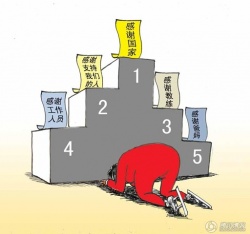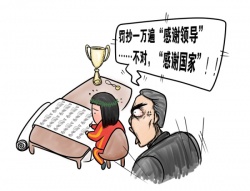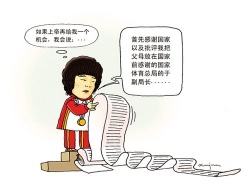“Thanks to the country”的版本间的差异
来自China Digital Space
| 第1行: | 第1行: | ||
| − | 感谢国家 ( | + | 感谢国家 (gǎnxiè guójiā): thanks to the country |
| − | + | [[File:ganxie3.jpg|250px|thumb|right|''Zhou Yang at the altar of the government’s priorities: (1) Thank the country, (2) Thank those who supported me, (3) Thank my coach, (4) Thank the staff, (5) Thank my parents.'']] | |
| + | [[File:ganxieguojia.jpg|250px|thumb|right|''“I am going to punish you by having you write the words, ‘Thanks to my leaders’ 10,000 times... No, that’s not right; how about you write, ’Thanks to the country.’”'']] | ||
| + | [[File:ganxie2.jpg|250px|thumb|right|''“If God gave me another chance, this is what I would say, ’First I want to thank my country and especially Yu Zaiqing, Deputy Director of the National Sports Bureau, who criticized me for first thanking my parents...’” '']]After Chinese speed skater Zhou Yang won the 1,500 meter event in the 2010 Vancouver Olympic Winter Games, she thanked her parents in a press conference. Yu Zaiqing, Deputy Director of the National Sports Bureau, criticized her for not first thanking her country. Heeding his advice, Zhou held a second news conference during which she first thanked her country, then her parents and coaches. | ||
| − | In | + | In Chinese Internet usage, “thanks to the country” is an ironic or sarcastic phrase implying that the thanks was either forced or not merited. It can be used after mentioning an action taken by the state with only minor benefits and substantial costs: “The world should really thank the country for spending US$60 billion on such a great [http://chinadigitaltimes.net/2010/10/shanghai-bids-farewell-to-massive-world-expo-fair/ World Expo],” or “[http://chinadigitaltimes.net/2010/05/kim-jong-il-shows-unusually-high-profile-in-china/ Kim Jong-il] should really thank the country for showing him such a good time while he’s in China.” It can also be used when the government takes small measures to address a problem that it caused in the first place: “I have to thank my country for ending the [http://chinadigitaltimes.net/2012/05/the-specter-of-the-cultural-revolution/ Cultural Revolution].” |
| − | |||
| − | [ | ||
| − | |||
| − | |||
| − | |||
| − | |||
[[Category: Grass-Mud Horse Lexicon]] | [[Category: Grass-Mud Horse Lexicon]] | ||
2013年4月10日 (三) 14:53的版本
感谢国家 (gǎnxiè guójiā): thanks to the country
After Chinese speed skater Zhou Yang won the 1,500 meter event in the 2010 Vancouver Olympic Winter Games, she thanked her parents in a press conference. Yu Zaiqing, Deputy Director of the National Sports Bureau, criticized her for not first thanking her country. Heeding his advice, Zhou held a second news conference during which she first thanked her country, then her parents and coaches.
In Chinese Internet usage, “thanks to the country” is an ironic or sarcastic phrase implying that the thanks was either forced or not merited. It can be used after mentioning an action taken by the state with only minor benefits and substantial costs: “The world should really thank the country for spending US$60 billion on such a great World Expo,” or “Kim Jong-il should really thank the country for showing him such a good time while he’s in China.” It can also be used when the government takes small measures to address a problem that it caused in the first place: “I have to thank my country for ending the Cultural Revolution.”







